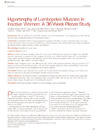Please use this identifier to cite or link to this item:
https://accedacris.ulpgc.es/jspui/handle/10553/72756
| Title: | Hypertrophy of Lumbopelvic Muscles in Inactive Women: A 36-Week Pilates Study | Authors: | Dorado García, Cecilia López-Gordillo, Ana Serrano Sánchez, José Antonio López Calbet, José Antonio Sanchís Moysi, Joaquín |
UNESCO Clasification: | 241106 Fisiología del ejercicio | Keywords: | Hypertrophy Magnetic Resonance Imaging Muscle Pilates-Based Exercises |
Issue Date: | 2020 | Journal: | Sports Health | Abstract: | Background: The use of Pilates in various fields of sport sciences and rehabilitation is increasing; however, little is known about the muscle adaptations induced by this training method. Hypothesis: A standardized Pilates training program for beginners (9 months; 2 sessions of 55 minutes per week) will increase the muscle volume and reduce potential side-to-side asymmetries of the quadratus lumborum, iliopsoas, piriformis, and gluteus muscles (gluteus maximus, medius, and minimus). Study Design: Controlled laboratory study. Level of Evidence: Level 3. Method: A total of 12 inactive, healthy women (35.7 ± 5.4 years) without previous experience in Pilates were randomly selected to participate in a supervised Pilates program (36 weeks, twice weekly). Muscle volume (cm3) was determined using magnetic resonance imaging at the beginning and end of the intervention program. Side-to-side asymmetry was calculated as [(left – right volume) × 100/right volume]. Results: Small, nonsignificant (P > 0.05) differences in the volume of the quadratus lumborum, iliopsoas, piriformis, and gluteus muscles were observed between pre– and post–Pilates program timepoints. Before and after Pilates, side-to-side asymmetry was less than 6% and nonsignificant in all muscles analyzed. Conclusion: Modern Pilates performed twice weekly for 9 months did not elicit substantial changes in the volume and degree of asymmetry of the selected lumbopelvic muscles in inactive women. Clinical Relevance: The benefits of Pilates in rehabilitation or training are likely elicited by neuromuscular rather than morphological adaptations. Pilates has no significant impact on muscle volume and does not alter side-to-side ratios in muscle volume (degree of asymmetry) of the lumbopelvic muscles. | URI: | https://accedacris.ulpgc.es/handle/10553/72756 | ISSN: | 1941-7381 | DOI: | 10.1177/1941738120918381 | Source: | Sports Health [ISSN 1941-7381], v. 12(6), p. 547-551 |
| Appears in Collections: | Artículos |
SCOPUSTM
Citations
3
checked on Jun 8, 2025
WEB OF SCIENCETM
Citations
3
checked on Jan 25, 2026
Page view(s)
291
checked on Jan 16, 2026
Download(s)
373
checked on Jan 16, 2026
Google ScholarTM
Check
Altmetric
Share
Export metadata
Items in accedaCRIS are protected by copyright, with all rights reserved, unless otherwise indicated.
